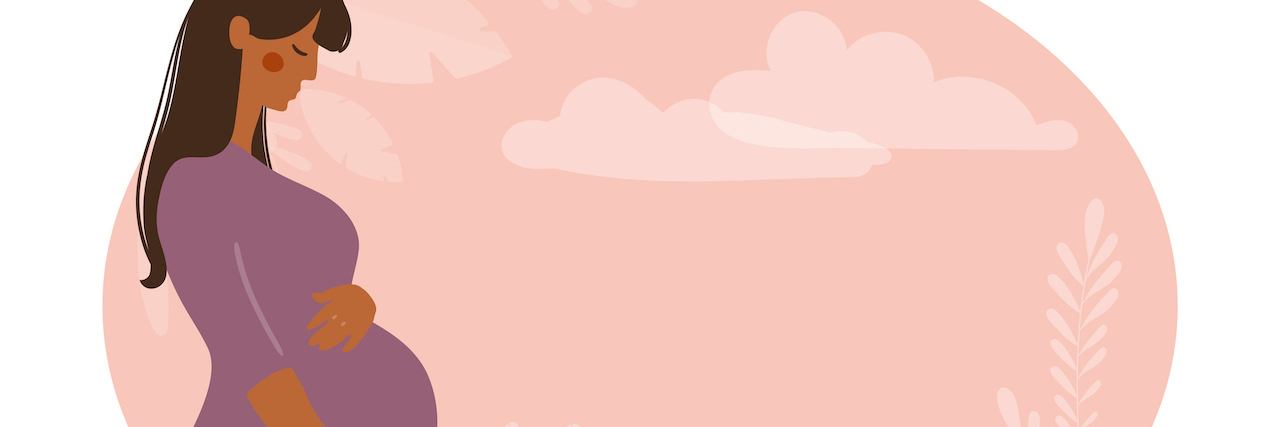Someone asked me recently if they should give my book, “Just Buy Her A Dress and She’ll Be Fine: My Postpartum OCD, Anxiety and Depression Story,” to a pregnant woman or would it scare her? She apparently already had some anxiety about becoming a new mom, which is why they were thinking about it giving it to her in the first place. I told them I think it would be a good thing to give it to them. I wrote it with some humor to lighten the subject and it has helpful information for any new or soon to be mom outside of just the postpartum mood disorder part.
Then today, in a support group I am in to provide support, a discussion began about how people, including a lot of doctors, do not discuss postpartum depression with pregnant women because they do not want to scare them. I think this is a huge mistake of course. I understand the concern. The last thing you want to do is stress a pregnant woman out, especially if she is already stressed. You are worried about her health and the health of the baby, but yet they do not mind putting you through the same regarding other health conditions that affect a lot less mothers. Every woman is screened for gestational diabetes despite the amount who get it being much lower, but every woman is not screened for postpartum mood disorders.
My doctors scared me as a new first time mom a couple of times while I was pregnant. We had to have extra ultrasounds to keep an eye on a possible kidney condition that turned out to be nothing. We also did extra ones to keep an eye on her large size, but she ended up coming on her own three and a half weeks earlier than they thought healthy and weighing eight and a half pounds. I am still glad we took these precautions even if it scared me a little and turned out to be nothing.
The fact that I thought motherhood would be mainly butterflies and rainbows is part of why I got postpartum depression in the first place. No one did me any favors by withholding helpful, true information. If anything, maybe it could have prevented it, or at least made it less severe, or I could have at least gotten help sooner.
Most women will not get a postpartum mood disorder, but a lot will. Many will get the baby blues for the first couple of weeks though, it is pretty normal, and up to 70-80 percent of new moms get these. If they do not know about those, they might feel guilty for not feeling joyful right away and that guilt could lead to them feeling blue for even longer.
I think so much of what many new moms go through can be prevented, which is why I try to shout all that happened to me from the rooftops. Women and everyone around them should know all about postpartum mood disorders even before they could get pregnant; it should be common knowledge. That is my hope for one day. Learning about them should not be scary, and if hearing about them does scare someone a lot, they probably already have some anxiety (which is a risk factor for getting them, so they really need the information).
Pretending they do not exist does not make them go away. Talking about them actually takes away their power. So what happens when someone does not get help? They often struggle in silence for years, and yes it can last for years, especially if you have a child, do not get better, have another child and so on. Maybe it sometimes eventually goes away on it’s own, but I think it instead it just changes from a postpartum mood disorder to a regular mood disorder or back to a regular mood disorder if you had one before, like me without realizing. If you never got help though and never address it, I think it will affect you and your children in negative ways. It adds to generational trauma and this is a best case scenario.
Worst case scenario is of course what you see on the news, a woman harming herself and/or her children. This is the reason a lot of women do not seek help. They worry someone will think they will hurt their children. That is rare, but still can happen without help, so help should be encouraged, not discouraged. A mom seeking help is a good mom. She should get the help she needs and if that requires a short time away from her kids, she should be reunited with them as quickly as possible once better.
It is more likely that a woman will harm herself and everything should be done to try and prevent this as well. Some other pretty bad things that can happen is postpartum mood disorders can destroy a marriage and break up a family. Sometimes maybe this was bound to happen anyways and that was just the breaking point, but it can even destroy the best of relationships. It can ruin other relationships as well with other family, friends and with your own children.
So if having posters and pamphlets everywhere, even in the waiting room during your pre- and post-birth appointments, or keeping those regular appointments you have before birth (even after birth) and being screened regularly for the first couple of years can prevent all of that, why would we not do it? If this was a regular thing, would it not make it less scary?
If people knew more about it, if people knew what to do if they had some of the risk factors or symptoms, it could be one small way to make it less scary.
Getty image by Tatyana Antusenok

